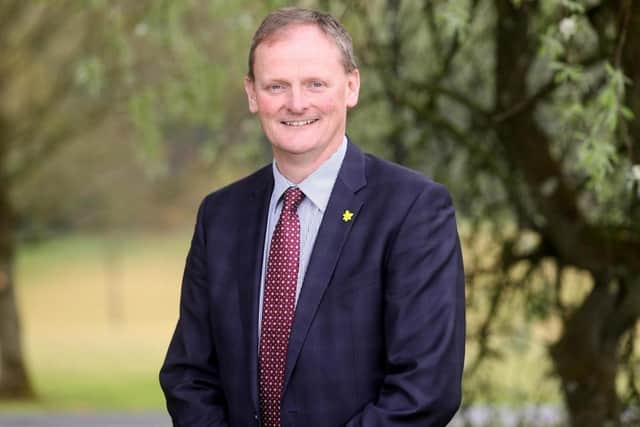Farm leaders confirm their priorities for 2023
and live on Freeview channel 276
He added: “It is my belief, that the dawn of 2023 will bring with it a year in which we are likely to see changes that could affect our industry for generations to come.
“Every single one of us is proud to produce some of the best food in the world, and with the right policy framework, we know we can deliver so much more.
Advertisement
Advertisement
“We can drive the rural economy, enhance our natural environment, contribute to national environmental targets and care for our cherished countryside so it can be enjoyed by everyone, while producing more home-grown, local food for shop shelves.”


According to Brown, the next 12 months could lay the foundations for a thriving food and farming sector where we are competitive both at home and abroad.
If the Department of Agriculture, Environment and Rural Affairs (DAERA) creates an agriculture policy which has a resilient food supply chain at its heart, we have the potential to not only be the number one supplier of choice for United Kingdom households, but a firm favourite for markets around the world too, he said.
The UFU president continued: “We cannot ignore the challenges of this year, if we do, we will miss the opportunities of the next one. The government needs to continue to take action to prevent a situation where British food is replaced by food imports – imports which could fall way below our own highly valued standards of animal health and welfare and environmental protection.”
Advertisement
Advertisement
Arguably, the biggest threat to farmers’ ambitions, according to the UFU, is the industry's ongoing struggle with the stranglehold that bovine tuberculosis (bTB) has over the Northern Ireland (NI) herd and NI farming families.
David Brown further explained: “I have lost count of the number of farming families I have met who have seen the future of their businesses thrown into turmoil, and in some cases, decimated by this awful disease ravaging through their herd.
Turn to page 7
“Words cannot do justice to the impact that the emotional strain caused by bTB has had on these individuals, to see their ambitions thwarted and much-loved animals culled because of the disease. It is utterly heart-breaking.
“The UFU will continue to put pressure on government to act upon the science and to fully implement its bTB strategy.”
Advertisement
Advertisement
He concluded: “As farmers, we all have a view on what would suit our business, and yet, UFU members come together to work for the common good of our industry. From our hill farmers to our vegetable growers, we all face different challenges.
“Yet, as an industry, we are interdependent on each other and in many ways, this is our greatest strength. Despite economic pressures, we continue to produce food and that will never go out of fashion.
“Finally, I wish everyone a prosperous and healthy New Year from myself and the entire UFU team. And please remember to stay safe when out and about on farms.”
Meanwhile, Farmers for Action (FFA) is characterising 2023 as a year of change with a strong focus on food security, education and health.
Advertisement
Advertisement
FFA spokesman William Taylor commented: “Food security can only be guaranteed when farmers are properly paid for their produce.
“Making this happen will require the passing of the Northern Ireland Farm Welfare Bill, as soon as possible, at Stormont.
“This would return family farmers a minimum of the cost of production plus a margin that is inflation linked at the farm gate for their produce.”
National Farmers’ Union (NFU) of England and Wales president Minette Batters has highlighted the critical role that agriculture must play within the British economy in here New Year message.
Advertisement
Advertisement
She said: “When I wrote last year’s New Year’s Message, nobody could have predicted what we’ve witnessed in the past 12 months.
“From the war in Ukraine, which has created global turmoil and significantly disrupted food and energy supply chains, to our own political upheavals. On top of that we’ve had soaring input costs and the effects of climate change demonstrated by this year’s drought; the challenges faced by us all have been unprecedented.”
Batters continued: “Clearly, events over the last year have made the job of producing food throughout the world so much harder. The importance of British farming to deliver food and energy has never been clearer.
“I never take for granted the huge public support farming receives and it is clear the nation continues to value our high food standards, produced to world-leading animal welfare and environmental protection, as well as our ability to produce renewable energy and contribute to the nation’s energy security.
Advertisement
Advertisement
“Looking to the year ahead, we have the opportunity to deliver more for the country. We have the ambition and drive to produce more renewable energy, enhance our environment, care for our countryside and work towards our commitment to reach net zero by 2040, all while producing sustainable food.
“To do this we need to ensure that we build profitability and resilience into our farm businesses to allow us to safeguard the nation’s food and energy security. It is vital that the government delivers the policies and investment needed to unlock a thriving food and farming sector.”